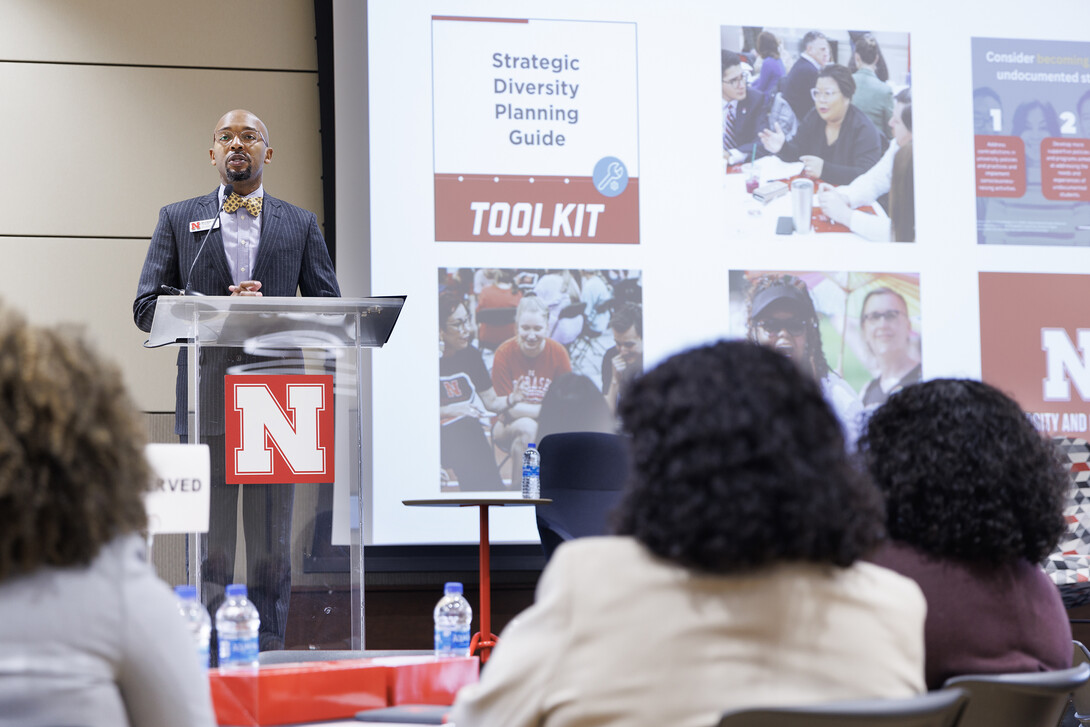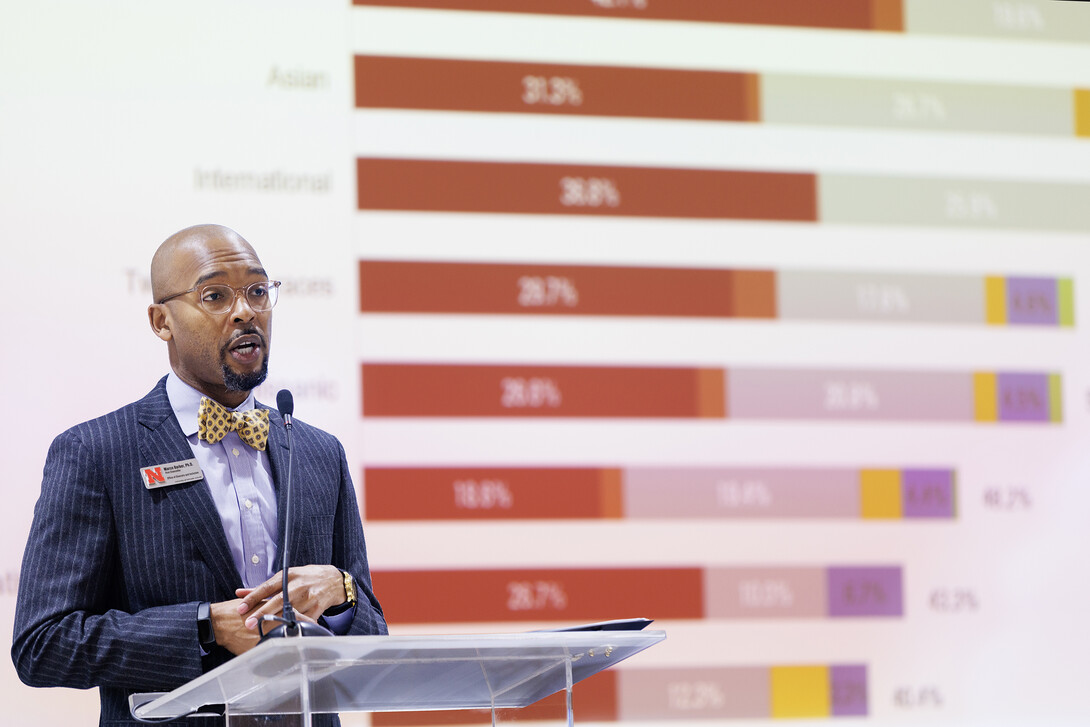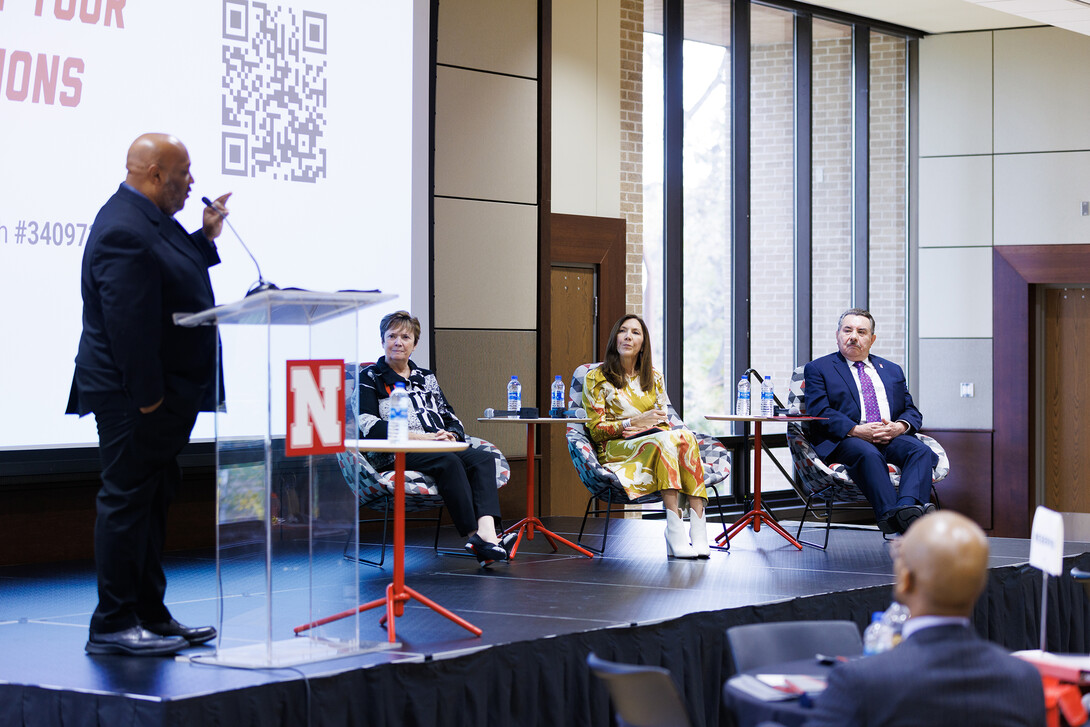
Faculty, staff and students gathered in person and virtually Oct. 26 for the fourth annual State of Diversity at the University of Nebraska–Lincoln, where they learned of many successful efforts that embody inclusive excellence across campus and opportunities to make greater impact.
“Something special is happening at Nebraska,” said Marco Barker, vice chancellor for diversity and inclusion.
Several efforts were highlighted in a video featuring Sherri Jones, dean of the College of Education and Human Sciences; Kwakiutl Dreher, associate professor of English and writer and director of “The Bell Affair”; McKinzie Sutter, lecturer in agronomy and horticulture; and Sophia Deras, OASIS peer mentor.
“Those are just a few examples,” Barker said. “We have so many faculty, staff and students who are putting this work into action, we could spend the whole day capturing the experience of those who are engaged in this work — so thank you for all you do.”
Barker also spoke about the plans that were developed by each of the colleges and units in partnership with the Office of Diversity and Inclusion, along with campus initiatives that include the Breakthrough Recruitment for Inclusive Diversity Growth and Excellence recruitment guide. BRIDGE, which was developed for faculty recruitment alongside the Office of the Executive Vice Chancellor, has now been expanded to provide resources for all searches.
The Office of Diversity and Inclusion compiles a complete report each year, collecting data on many facets of diversity, equity and inclusion. In a data snapshot during the event, Barker shared both successes and challenges, including the dip in enrollment from the COVID-19 pandemic and the changes for international students that have likewise impacted enrollment.
“We can see there has been an overall net increase in our enrollment in students of color over the last five years,” Barker said.
Nebraska saw an increase among underrepresented populations in graduate student enrollment, the graduation of record classes, and increased access for students through the Pell Grant and other Nebraska-specific programs.

“Approximately one in five UNL students get Pell Grant funding, which is more than the national average, and I was extremely proud of that,” Barker said. “Our students receiving loans is slightly below or right at the national average, which is ideally a great place for us to be in terms of the focus on access for students.”
Barker also noted that the numbers of Regents Scholarships awarded to low- and middle-income families, students of color and first-generation students have all grown in the last three years.
Some of the data is available at the ODI website and in the 2021 annual report, which is also online.
The data snapshot was followed by a discussion moderated by Jamal Watson, editor at Diverse: Issues in Higher Education, with a panel composed of Antonio Flores, president and CEO of the Hispanic Association of Colleges and Universities; Carrie Billy, president and CEO of the American Indian Higher Education Consortium; and Lynn Pasquerella, president of the American Association of Colleges and Universities.

The panel touched on many topics, but consistent themes were increasing access and creating a welcoming climate for all.
As president of AIHEC, Billy frequently talks with leaders of tribal colleges and asks about the relationships between the tribal colleges and state-funded institutions. She lauded the university for maintaining positive relations with the tribal colleges but challenged Nebraska to further develop pathways for those students to matriculate to the university.
“There are areas for improvement, and one of those ways is creating pathways for students, including making sure that all the credits the students are (enrolled) in are aligned at the tribal college, so they can transition and save all of their credits,” Billy said. “We see that as a big roadblock that needs to be eliminated. That’s probably where I would focus first.”
Flores agreed. Nebraska has several community colleges that are Hispanic-serving institutions, he said, and partnerships with them could be strengthened to increase access to a four-year degree.
Pasquerella connected access and climate, stressing that connections with the broader community and state can build a sense of belonging and buttress against rhetoric that is meant to tear at public trust in institutions.
“The University of Nebraska–Lincoln is serving as an anchor, demonstrating that your success is inextricably linked to the social, health, economic, educational well-being of those in the community,” she said. “This is what every institution of higher education needs to do if we are to create access … a sense of welcome and belonging.
“Being visible in communities extends an invitation in ways that really help create access, a sense of social and cultural capital that will be necessary for students to thrive once they’re here.”
The State of Diversity ODI updates and panel presentation are available online.







